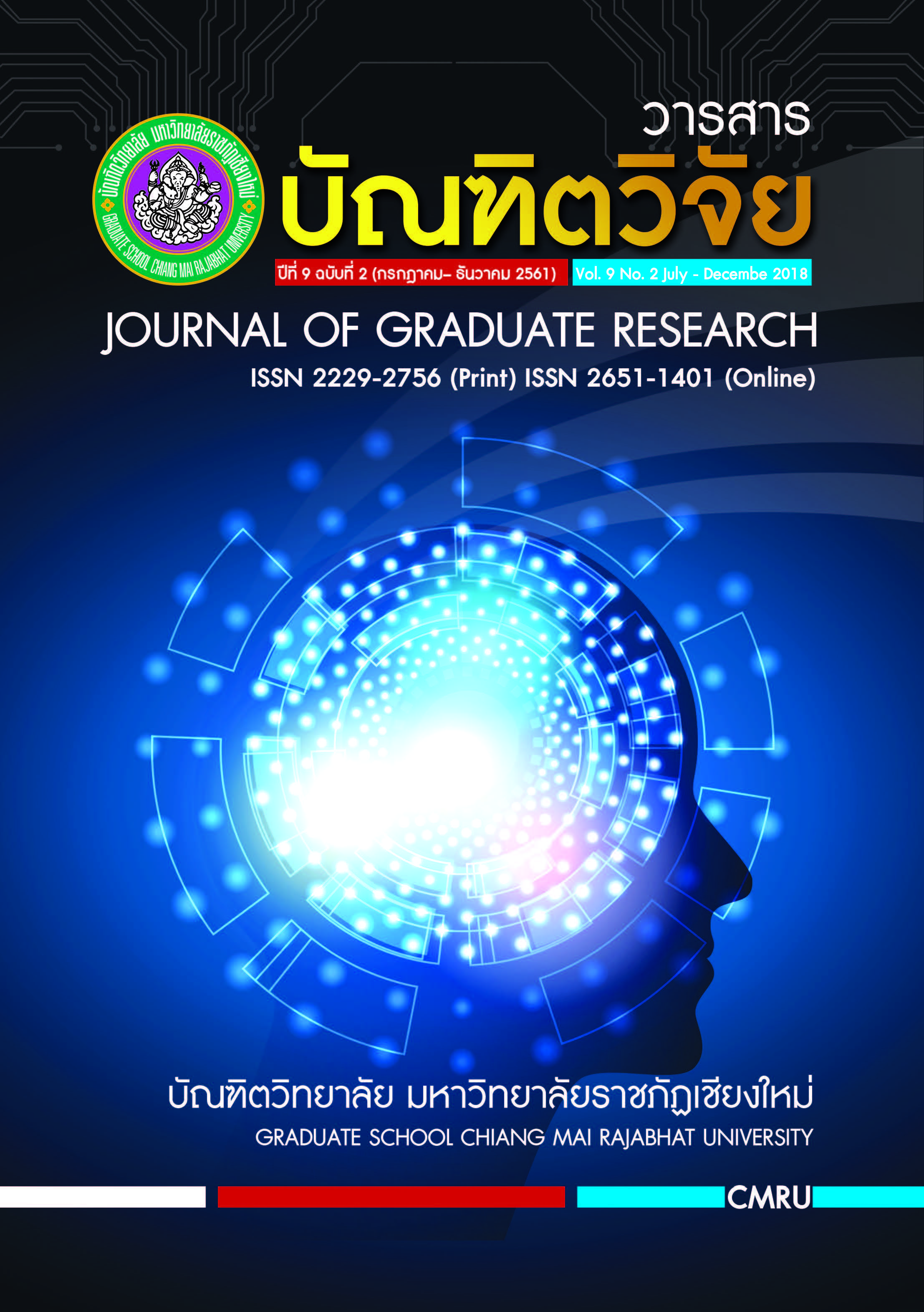The Participation of Parents in Learners’ Development of Mitmuanchonchiang Mai, Chiang Dao District, Chiang Mai
Main Article Content
Abstract
The purposes of this study were 1) to study the participation of parents in learners’ development; 2) to compare the parental participation classified by their occupation, income, and tribe; and 3) to study guidelines for the parent’s participation in learners’ development.
The samples consisted of 183 parents at Mitmuanchon Chiang Mai School in the 2015 academic year. The research instrument was a rating-scale questionnaire, with reliability coefficient of 0.96.Thequantitative data were statistically analyzed for frequency, percentage, mean, standard deviation, and one-way analysis of variance; while the qualitative data were analyzed by the content analysis.
The research findings showed that (1) both overall and individual aspects of parents’ participation in learners’ development were rated at the high level, with the aspects receiving the top rating mean being those of parenting, followed by those of communicating, learning at home, and decision making respectively. (2) In general, the participation of the parents in learners’ development revealed that the participation of those with different occupations, incomes and tribes was not significantly different at the .05 level.3) The guidelines for the parent’s participation in learners’ development were as follows. The parents should develop children to help themselves. The school should add data communication channelson children’s behavior between parents and schoolteachers. The parents should participate in school activities by providinglabor force, money, food and drink or required materials. The parents should pay more attention to children’s homework. The parents should share their opinions or comments on their children development planning with the teachers and the parents should encourage their children to get involved in community development activities.
Downloads
Article Details
References
คณะทำงานโครงการคลังปัญญางานพัฒนาชาวเขา 53 ปี. (2555). ลีซอ. กรุงเทพฯ: สำนักงานกิจการโรงพิมพ์องค์การสงเคราะห์ทหารผ่านศึก.
ฐิตินันท์ ทองอยู่ และสุริยะ เจียมประชานรากร. (2557). การมีส่วนร่วมของผู้ปกครองในการจัดการเรียนการสอนของโรงเรียนเทศบาลบ้านหัวหินจังหวัดประจวบคีรีขันธ์. (วิทยานิพนธ์ศึกษาศาสตรมหาบัณฑิต, สาขาการบริหารการศึกษา มหาวิทยาลัยราชภัฏสวนดุสิต).
พิพิธภัณฑ์ชาวเขาออนไลน์. (2557). ลีซอ. สืบค้นจาก https://www.hilltribe.org
เพ็ญศรี ไชยสลี. (2559). การมีส่วนร่วมและแนวทางการพัฒนาของผู้ปกครองในการจัดการเรียนรู้ระดับปฐมวัยโรงเรียนสาธิตอุดมศึกษาสังกัดคณะกรรมการส่งเสริมการศึกษาเอกชนสำนักงานเขตพื้นที่การศึกษาประถมศึกษาชลบุรี เขต 3. (วิทยานิพนธ์การศึกษามหาบัณฑิต, สาขาวิชาการบริหารการศึกษา มหาวิทยาลัยบูรพา).
มูฮัมหมัดนาซีรีน โต๊ะลู. (2558). การมีส่วนร่วมของผู้ปกครองในการจัดการศึกษาของโรงเรียนเอกชนสอนศาสนาอิสลามในจังหวัดปัตตานี. (วิทยานิพนธ์ศึกษาศาสตรมหาบัณฑิต, สาขาวิชาการบริหารและการจัดการการศึกษาอิสลาม มหาวิทยาลัยสงขลานครินทร์).
วิวรรณ สารกิจปรีชา. (2554). การศึกษาความสัมพันธ์ระหว่างคุณลักษณะของผู้ปกครองกับพฤติกรรมการมีส่วนร่วมของผู้ปกครองในการส่งเสริมการเรียนรู้ของนักเรียนโรงเรียนอนุบาลกุ๊กไก่เขตคลองเตยกรุงเทพมหานคร. (สารนิพนธ์การศึกษามหาบัณฑิต, สาขาวิชาการบริหารการศึกษา สาขาวิชาการบริหารการศึกษา มหาวิทยาลัยศรีนครินทรวิโรฒ).
สมัย สุทธิวรรณ. (2541). สารคดีชนกลุ่มน้อยบนดอยสูง แม้ว. กรุงเทพฯ: เลิฟแอนด์ลิพเพรส.
สราวดี เพ็งศรีโคตร และจันทร์ชลี มาพุทธ. (2554). รูปแบบการมีส่วนร่วมของผู้ปกครองในการจัดการศึกษาปฐมวัย. การศึกษาและการพัฒนาสังคม, 7(1), 68-82.
สำนักงานคณะกรรมการการศึกษาแห่งชาติ. (2545). รายงานการศึกษาเรื่องความร่วมมือระหว่างบ้านและโรงเรียน. กรุงเทพฯ: พริกหวานกราฟฟิค.
สำนักงานส่งเสริมและสนับสนุนวิชาการ 10. (2554). รัฐชาติและชาติพันธุ์. เชียงใหม่: สำนักงานส่งเสริมและสนับสนุนวิชาการ 10 จังหวัดเชียงใหม่กรมพัฒนาสังคมและสวัสดิการ.
สิริมา ภิญโญอนันตพงษ์. (2546). ปัจจัยสิ่งแวดล้อมทางบ้านโรงเรียนและท้องถิ่นตามวิถีไทยที่ส่งผลต่อศักยภาพทางปัญญาของเด็กปฐมวัยในชนบท. กรุงเทพฯ: มหาวิทยาลัยศรีนครินทรวิโรฒ.
สิรินทิพย์ สิทธิศักดิ์. (2554). การมีส่วนร่วมของผู้ปกครองในการบริหารโรงเรียนอาชีวศึกษา: กรณีศึกษาเขตภาษีเจริญและเขตบางกอกใหญ่. (วิทยานิพนธ์ศิลปศาสตรมหาบัณฑิต, สาขาวิชาพัฒนาสังคมและสิ่งแวดล้อม สถาบันบัณฑิตพัฒนบริหารศาสตร์).
สุธรรม นันทมงคลชัย. (2559). ครอบครัว การอบรมเลี้ยงดู และพัฒนาการเด็กประถมวัยในประเทศไทย. สาธารณสุขศาสตร์, 46(3), 205.
สมหวัง พิธิยานุวัฒน์. (2550). มาตรฐานตัวบ่งชี้และเกณฑ์การพิจารณาเพื่อการประเมินคุณภาพภายนอกระดับการศึกษาขั้นพื้นฐาน รอบ 2 (พ.ศ. 2549-2553). กรุงเทพฯ: จุดทอง.
อภิชาต การิกาญจน์. (2552). หลักสูตรใหม่กับการพัฒนาคุณภาพขั้นพื้นฐาน. คมชัดลึก. 2552 พฤศจิกายน 24; น. 7. (คอลัมน์การศึกษา สาธารณสุขวัฒนธรรม).
Amenu – Tekaa, C. E. K. (1988). Perception of community participation in education on Canadian Indian Reserves: A North-Central Alberta case study (Native American). Dissertation Abstracts International, 49(7), 1626.
Epstein, J. (1995). Six Types of ParentsInvolvement in Schools. North Central Regional Education Laboraty. Retrieved from https://www.ncrel.org/sdrs/areas/issues/envrnmnt/famncomm/pa11k4.htm
Krejcie, R. V. & Morgan, D. W. (1970). Determining Sample Size for Research Activities. Educational and Psychological Measurement, 30(3), 607-610.


